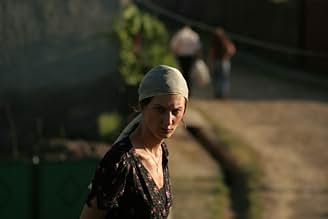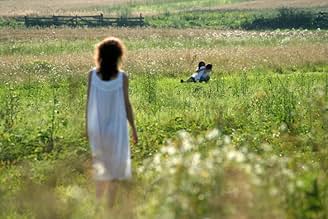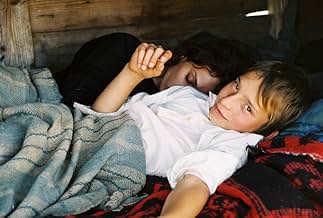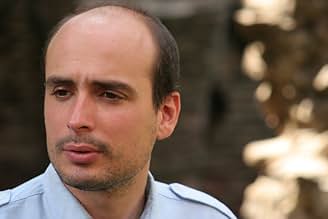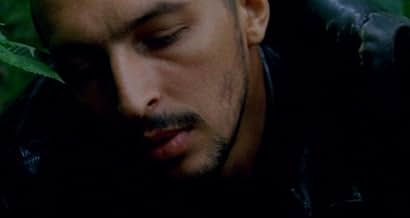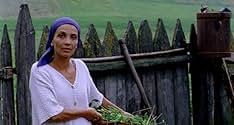Katalin Varga
- 2009
- Tous publics
- 1h 22m
IMDb RATING
7.0/10
3.2K
YOUR RATING
Katalin, a woman raped in the Carpathian Mountains, seeks revenge with a boy, questioning morality's complexities as she confronts her past.Katalin, a woman raped in the Carpathian Mountains, seeks revenge with a boy, questioning morality's complexities as she confronts her past.Katalin, a woman raped in the Carpathian Mountains, seeks revenge with a boy, questioning morality's complexities as she confronts her past.
- Awards
- 14 wins & 16 nominations total
Tibor Pálffy
- Antal Borlan
- (as Tibor Pálfy)
- Director
- Writer
- All cast & crew
- Production, box office & more at IMDbPro
Featured reviews
I missed this first time round and am so glad I caught up with it at an afternoon showing at a local independent cinema. Even more encouraging was that I expected to be the only person there but, although only a smattering of people (in a large auditorium), there were enough to create an atmosphere (that may be in my head but hopefully some people will get what I mean). So, transfixed by Hilda Peter from the outset, the film moved beautifully through dreamy countryside as the revelation of a hidden secret drove Katalin and her son away from their marital home. The menacing undertone haunted their journey to remote villages, the audience waiting for the inevitable vengeance to erupt. The nature of the film and its brutal climax prompted something I love to see as the credits rolled. No one moved or spoke. If the audience is out of their seats the second the picture fades I feel either they're relieved the film has finished or have weak bladders or a drink problem. Katalin Varga was successful in conquering the audience, an endorsement of its quality. See it.
Peter Strickland's debut movie Katalin Varga reminds me very much of another recent British film, Asif Kapadia's 2007 effort Far North, which is also a folk horror story about an outcast and her child. Stickland uses the dank forest of Romania instead of the perilous ice flows of the north, but the movies are birds of a feather, low budget movies intended to tap primal energies.
Children run away from Katalin Varga, a darkly pretty woman with live-wire eyes, who's altogether too spirited to remain unmolested in the time-capsuled world with which the movie presents te viewer. Folk have mobile phones, but Katalin still travels by horse-drawn cart, and men still make hay in the fields with pitchforks. Gossip in Katalin's village is poisonous enough to make Clouzot's vision in Le Corbeau appear positively made of marshmallow. Following the repurcussions of gossip regarding Katalin's past, she travels with her child into an apparently infrastructure-less hinterland on a dark mission, like black lightning.
It's no surprise to find, following shot after shot of foreboding nature scenes, that this is a tragedy, in a cul-de-sac structure similar to Monte Hellman's brilliant 1965 movie Ride in the Whirlwind.
It's a brutal movie, in structure rather than in screen violence, which there is remarkably little of, and which is generally obscured in incoherence when it occurs. It's almost senseless and left me with a directionless primitive anger.
Children run away from Katalin Varga, a darkly pretty woman with live-wire eyes, who's altogether too spirited to remain unmolested in the time-capsuled world with which the movie presents te viewer. Folk have mobile phones, but Katalin still travels by horse-drawn cart, and men still make hay in the fields with pitchforks. Gossip in Katalin's village is poisonous enough to make Clouzot's vision in Le Corbeau appear positively made of marshmallow. Following the repurcussions of gossip regarding Katalin's past, she travels with her child into an apparently infrastructure-less hinterland on a dark mission, like black lightning.
It's no surprise to find, following shot after shot of foreboding nature scenes, that this is a tragedy, in a cul-de-sac structure similar to Monte Hellman's brilliant 1965 movie Ride in the Whirlwind.
It's a brutal movie, in structure rather than in screen violence, which there is remarkably little of, and which is generally obscured in incoherence when it occurs. It's almost senseless and left me with a directionless primitive anger.
Great, atmospheric effort from Strickland. I can only imagine he had some affinity with this part of Romania whether from childhood or other. The soundtrack and some of the slow lingering shots (esp. the scene looking at child, mother and horse not moving from behind, and the forest shot) were very affecting, and reminded me of Tarkovsky (not in a bad way ;)I got to thinking of the inextricable nature of all things, of how everything (as a single glorious 'entity') was so deviously and religiously bound up that to even attempt to extract something from it was tantamount to destructuring the whole (and thus destroying its royalty). That a film can inspire me (it has to be said not single-handedly)to such ends is indicative of a deep metaphysical quality within it.There is a particular sentence that the man utters towards the end of the film that resonates deeply towards this metaphysis. I shan't explicate it, nor even repeat it, but you shall know it when you hear it.
Thanks for this Strickland, and all who were involved in and outside it (even the guy who carted the extra film stock when, presumably, you ran out ;) 'Ultimately, there are no parts at all.' Fritjof Capra, The Web of Life.
Thanks for this Strickland, and all who were involved in and outside it (even the guy who carted the extra film stock when, presumably, you ran out ;) 'Ultimately, there are no parts at all.' Fritjof Capra, The Web of Life.
I borrowed the DVD from a local store, being sure that this is going to be a good movie. I read good reviews of it. Now I'm quite disappointed after seeing it. The movie is good enough until the scene where the woman is telling her rape experience finishes. The story of the rape is the best part. As the camera focused on the characters' faces, Katalin tells her horrific story, disconnected from the suffering that we would expect. That gives the character a lot of power. She is in a position of control, she overcame the bad experience and her main weapon is the truth, because the truth will really ruin the precious relationship of Katalin's aggressor with his wife. The story of the rape is told in such intimate detail, that you may feel various emotions, like empathy, justice being done, concern for any of the characters, each of them may be in a dangerous position. The situation is very much like one from Sadoveanu's novel "Baltagul". After this wonderful artistic moment, the rest of the movie is full of broken links. The man's regret for what he has done is very unrealistic, not that this might not happen in real life, but his state is not supported by the play and the character's story. Then, the suffering for the loss of his wife is too short. The wife, a devoted Christian, commits suicide (that's possible, but not very probable) without many explanations given to us. The man suffers too little after that because he is quite preoccupied with his relation with Katalin and her son. Many other disharmonious details disconnected me from the movie. I also have some personal regrets, that the Romanians in the movie are all mean characters. There's no obvious reason in a movie where 99 percent of the time you have Hungarian language speaking, only three short but significant dialogues are in Romanian. In one of them we have the girls eating sunflower seeds that are not helping the strangers in need without judging or mocking them. Eating sunflowers in public in Romania is associated with low class, specially because it's a Balkan habit mostly associated with gypsies. Speaking of gypsies, I can not get over the idea that the first victim of Katalin is associated with Gypsies and undoubtedly this is part of the construction of an evil character. The other two scenes with Romanians are the ones involving the vengeful criminals, one of them showing a twisted faith in God. Anyway, it could have been a good movie, but amateurish errors and a bit of xenophobia (I suppose) ruined it for me. I may keep in mind as good parts: landscapes, music and the boat scene.
Obviously filmmaker Strickland has a special interest in women's world. Hilda Péter is simply brilliant as the strong willed woman, giving it a mythical inner power and carries the whole show. Shot in 17 days, the movie has the stamp of a genius inspiration. I think it would easily be considered masterpiece in case it was part of a grander philosophical undertaking.
Did you know
- TriviaThe film was shot in Romania in July 2006 for around £25,000 with a small crew of 11 people (including transport and catering). Strickland paid everyone on the 17-days-shoot himself, apart from the focus-puller, who agreed to work for free. The whole crew and the actors lived together in an empty house in a small village in the Carpathian Mountains. After the shoot Strickland ran out of money while editing. He approached many UK production companies, but the reaction was always negative because an obscure film by an unknown director, not even in the English language, seemed to put off all UK investors. Only two Romanian producers, Oana Giurgiu and Tudor Giurgiu, paid attention. They saw Strickland's rough cut and came on board as co-producers, providing the funds to make a proper sound-mix and a blow-up from the Super-16mm negatives to 35mm. It was then invited and shown in competition at the '59th Berlin International Film Festival' in 2009 and won the 'Outstanding Artistic Contribution' award for the creative sound design. Without the Romanian producers, the film would never have been properly finished.
- ConnectionsReferenced in Cowboy (2017)
- SoundtracksThe Grave and Beautiful Name of Sadness
- excerpts taken from "The Sadness of Thing"
Written by Steven Stapleton and David Tibet
Performed by Steven Stapleton and Geoff Cox
- How long is Katalin Varga?Powered by Alexa
Details
- Release date
- Countries of origin
- Official site
- Languages
- Also known as
- 卡塔琳的秘密
- Filming locations
- Production companies
- See more company credits at IMDbPro
Box office
- Gross worldwide
- $28,399
- Runtime1 hour 22 minutes
- Color
- Sound mix
- Aspect ratio
- 1.85 : 1
Contribute to this page
Suggest an edit or add missing content



